small blue flower blooms early spring
Bulbs
When I think of spring, the first plants that come to mind are the bulb flowers, dormant for three seasons, and springing to life for one brief, glorious show. Many are best planted in the fall, as they need chill time before growth occurs.
Here are some you can count on to naturalize in the garden, spreading like carpets of color with the passing years.
1. Crocus
The crocus, genus Crocus, is a classic herald of spring.
Suited to USDA Hardiness Zones 3 to 8, they are available in shades of purple as well as orange, pink, white, and yellow. The foliage is narrow and grass-like.
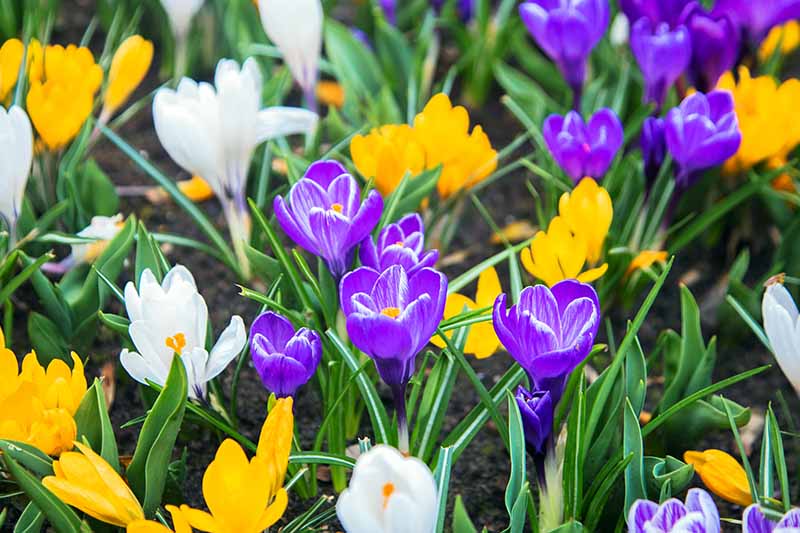
Crocuses naturalize rapidly, forming carpets of color over the years. In addition to the spring bloomers, there are autumn varieties that are suited to Zones 6 to 10.
Provide a location with full sun to part shade, and organically-rich soil that is slightly acidic. Good drainage is essential.
Consult our crocus growing guide for all you need to know to cultivate this plant in your landscape.
Reliable and frost tolerant, crocuses top out at a petite 3 to 6 inches. You may spot your first one peeking up through some late winter snow.
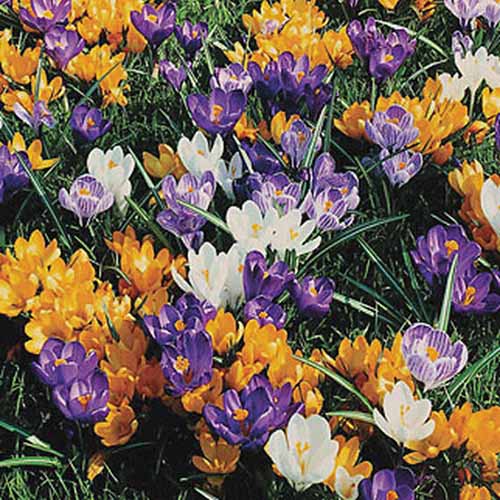
'Giant Mix'
Best uses include mixed or mass plantings in beds, borders, containers, drifts, or window boxes.
Find 'Giant Mix' bulbs now from Burpee in packages of 12, and enjoy an assortment of yellow, purple, white, and bicolor blooms.
2. Daffodil
The daffodil, Narcissus (Group) is a sturdy, trumpet-shaped flower that is best known for its classic bright yellow color.
However, there are 13 divisions of Narcissus and many different varieties exist. Additional colors include pink, white, and two-tone combinations.
There may be one or more flowers per stem, and a single or double row of tepals, a term used to describe indistinguishable petals and sepals.
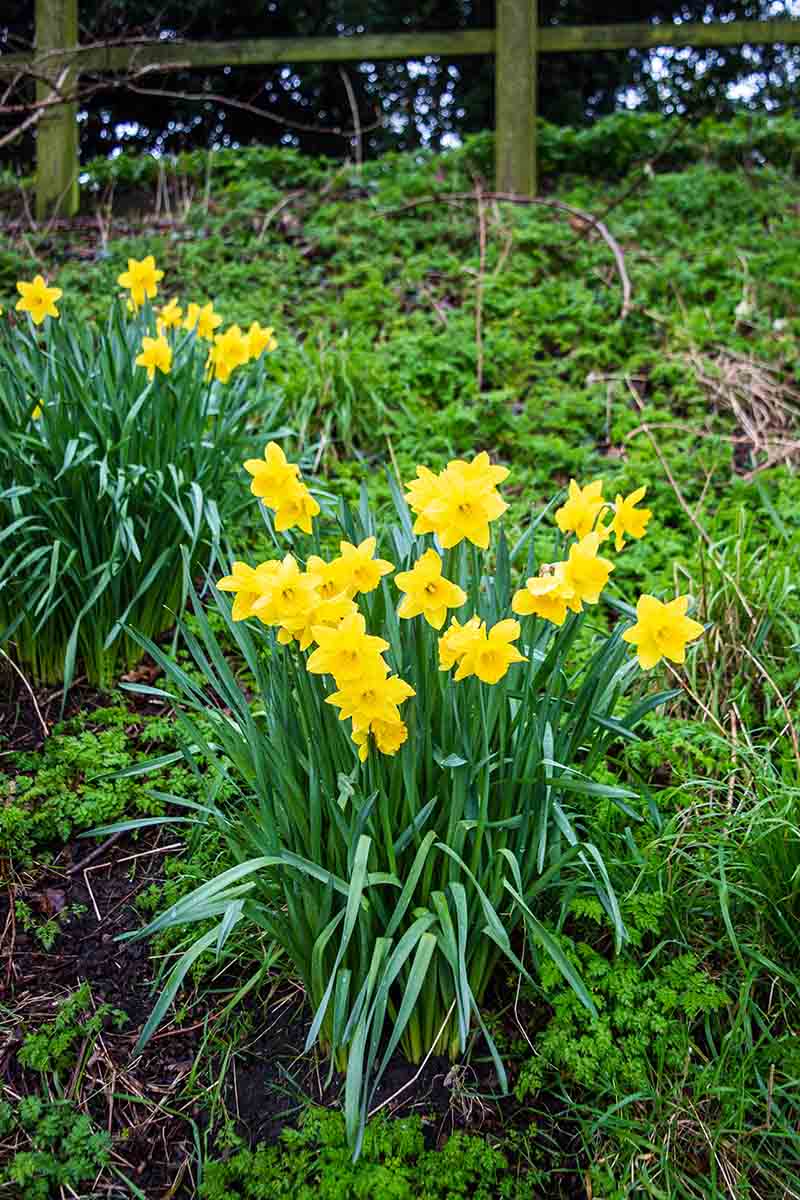
Daffodils grow in clumps and naturalize well. Unlike tulips bulbs, they have little to no appeal to foraging wildlife.
The foliage of this sturdy plant consists of leaves that are narrow and strap-like.
Ideal planting conditions include a location with full sun to part shade, and organically-rich soil with a slightly neutral pH that drains well.
Read our daffodil growing guide for all you need to know about cultivation.
Heights range from 6-inch dwarf varieties to 22-inch giants.
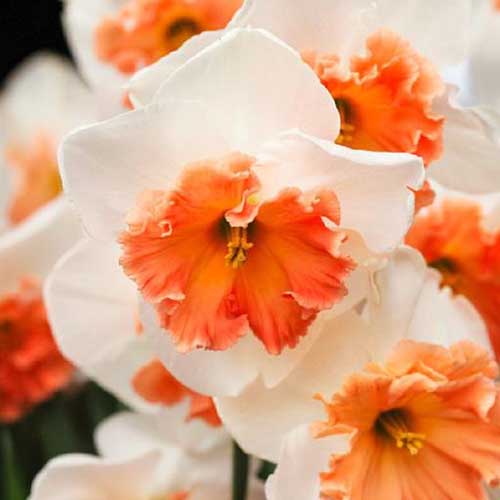
'Precocious'
Daffodils are often interplanted with snowdrops, hyacinths, and tulips for a succession of blooms in beds, borders, containers, and mass planting schemes.
This plant thrives best in Zones 4 to 8.
Find 'Precocious' bulbs now from Eden Brothers in packages of 10, 20, 50, or 100. Luxuriously ruffled bright peach-pink trumpets are backed by a single row of creamy white tepals.
3. Early-Blooming Dwarf Iris
Early-blooming dwarf iris, Iris reticulata, is a fragrant miniature plant that bursts into bloom early in the season in Zones 5 to 9.
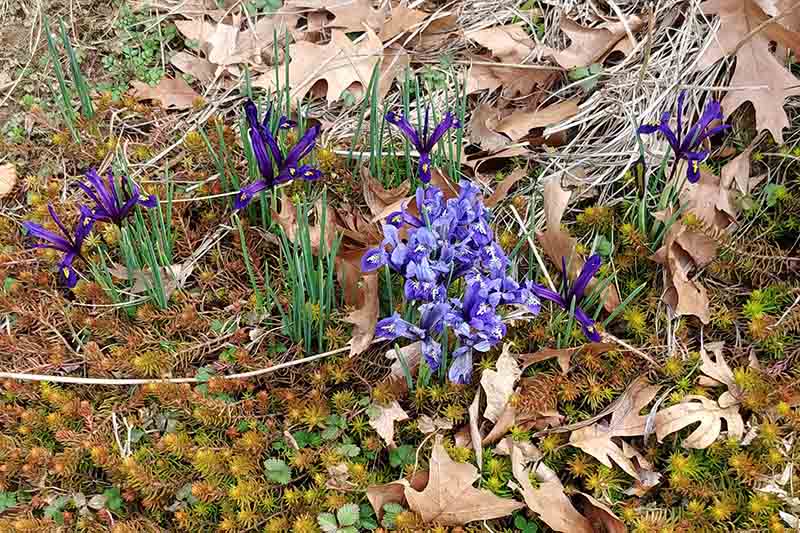
I love mine. As winter yields to spring, I begin to check for flowers. The first hint of life is the foliage that resembles very erect dark green grass.
In the seven years I've had them, I can honestly say I've never seen them in the bud stage. One day there's foliage, the next, gorgeous blooms.
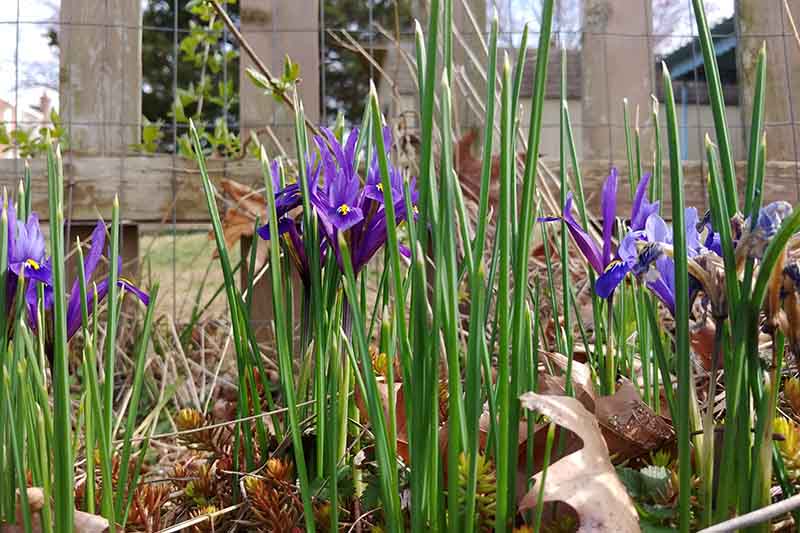
The falls, or tepals that droop, have a splash of gold called a signal, as well as white striations. The upright tepals, called standards, are solid blue-purple.
Over the years, they have begun to naturalize in my woodland garden, with a tendency to grow very close together.

Early-Blooming Dwarf Iris
Mine bloom in two waves, in various shades of dark to light blue and purple, as they peak and wane.
Grow early-blooming dwarf iris in full sun to part shade, in average soil that is slightly acidic and drains well.
Review our complete iris growing guide for further information.
This is a low-profile plant with a maximum height of 6 to 8 inches. It is especially suited to containers and window boxes, where its exquisite details may be appreciated at eye level.
Find early-blooming dwarf iris bulbs now from Amazon in packages of 25.
4. Glory of the Snow
Glory of the snow, Chionodoxa forbesii, has violet-blue, star-shaped flowers with white center "eyes" that face cheerfully upward.
It grows in a clumping fashion. The foliage is strap-like, and both stems and leaves have a reddish tint.
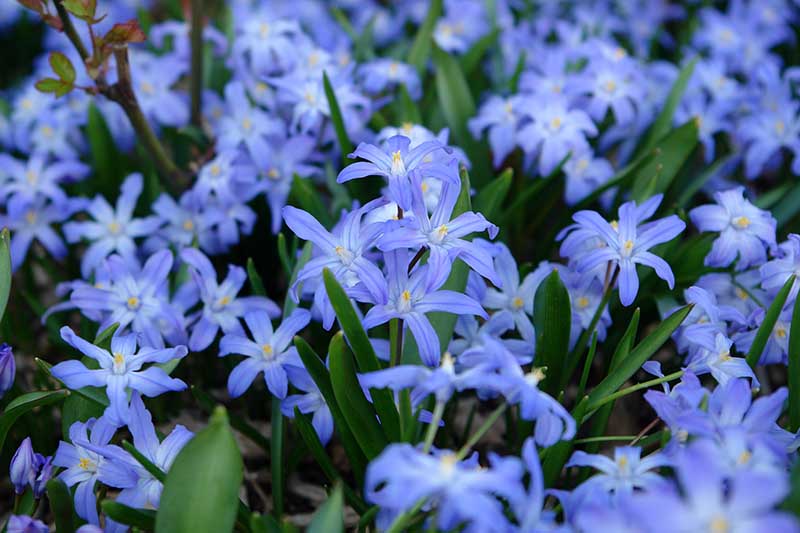
Ideal growing conditions include full sun to part shade and average, well-draining, slightly acidic soil. Glory of the snow is best suited to Zones 3 to 8.
Heights range from 6 to 12 inches. It's an excellent choice for rock gardens, and works well as a companion to other early spring bulbs.

Glory of the Snow
Glory of the snow tolerates the juglone toxicity of black walnut trees very well, and makes a lovely showing en masse beneath it and other trees and shrubbery.
Find glory of the snow bulbs now from Thronesfarm via Amazon in packages of 10.
There is another species of glory of the snow, Chionodoxa lucileae, that varies slightly from Chionodoxa forbesii. It has 3- to 6-inch stems with fewer flowers per stem. They are slightly larger, but not as starry in shape.
5. Grape Hyacinth
Grape hyacinth, Muscari spp., is a fragrant flower with spikes of multiple tiny blooms that resemble bunches of grapes.
The best-known color is blue-purple, but there are also shades of pink, white, and yellow available. The foliage looks like floppy grass.
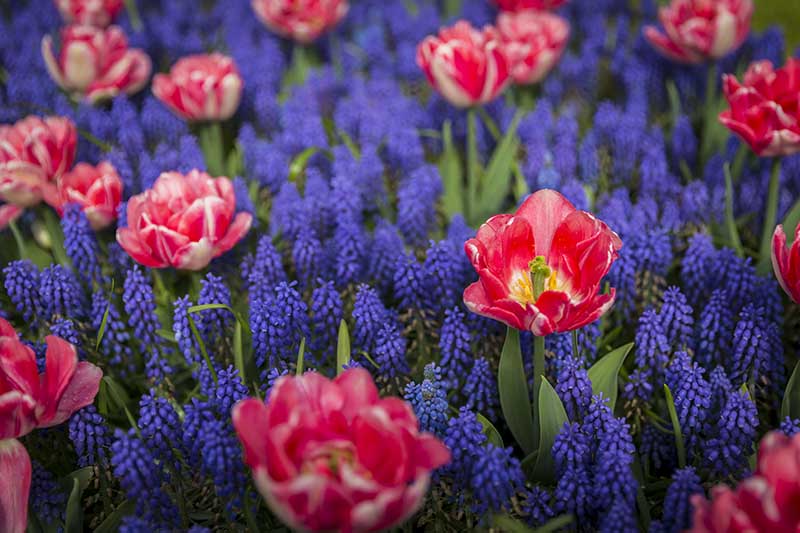
This plant thrives in full sun to part shade with average, well-draining soil that has a pH close to neutral (7.0).
Consult our guide to growing grape hyacinths for more information.
Heights range from 6 to 12 inches, making grape hyacinth a fine choice for beds, borders, containers, drifts, and window boxes.
Plant en masse for a spectacular monochromatic display, or interplant with companions of similar stature, such as crocus, dwarf iris, and glory of the snow.
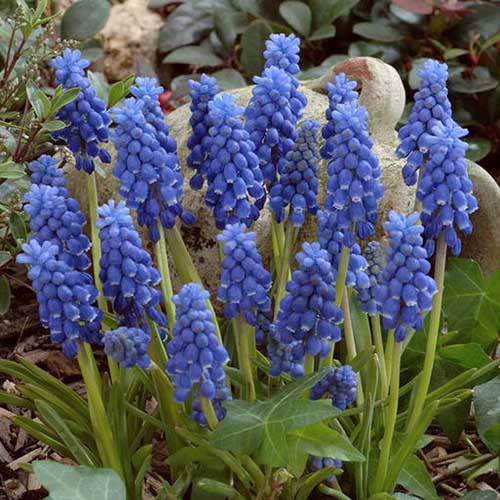
Grape Hyacinth
Most muscari varieties are suited to Zones 4 to 8, although some thrive in Zones 3 or 9 as well.
Find grape hyacinth bulbs now from Eden Brothers, in packages of 25, 50, or 100. These are deep blue and reach a height of 8 to 9 inches.
6. Lily of the Valley
Lily of the valley, Convallaria majalis, is known for its fragrant white or pink bell-shaped blossoms.
There are between five and 15 flowers on each slender stem. The leaves are elliptical with parallel ridged veins.
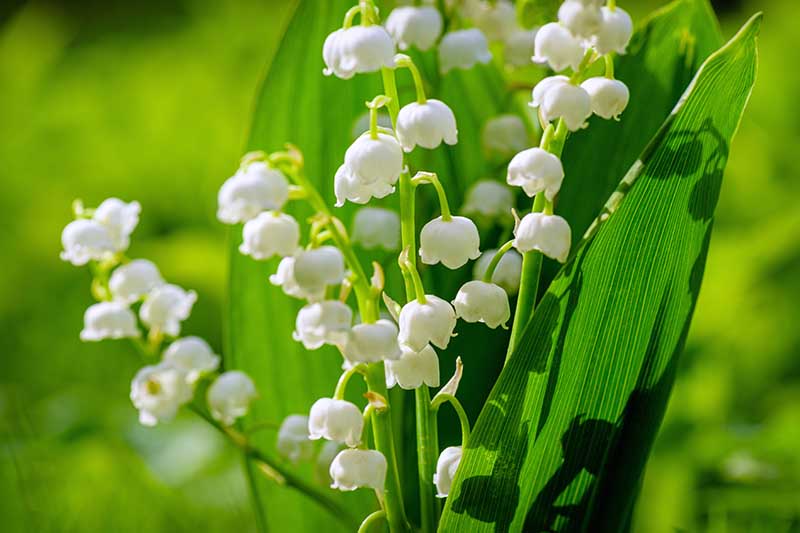
It prefers a shady location with organically-rich soil that drains well. The ideal pH is slightly acidic (less than 7.0).
See our guide to growing lily of the valley for cultivation instructions.
Lily of the valley grows well underneath shrubbery and trees where it has room to naturalize in dense clumps.
It looks beautiful in stand-alone drifts, or interplanted with hosta, another shade lover.
This plant is best suited to growing in Zones 2 to 9. Heights range from 12 to 22 inches.
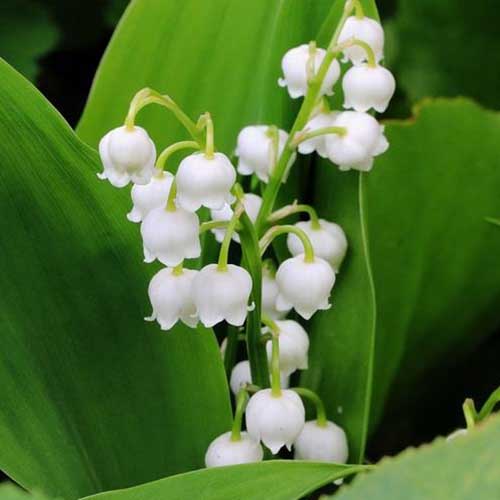
Lily of the Valley
It spreads vigorously, so consider containment measures such as deeply placed garden edging material, like concrete pavers. Dividing it periodically is another good way to curb its enthusiasm.
Do not plant lily of the valley in the Midwest, where it has become invasive.
Find bulbs now from Eden Brothers in bags of 2, 4, or 6.
7. Siberian Squill
Low-profile Siberian squill, Scilla siberica, has 1 to 3 light blue, nodding, bell-like blooms per stem.
It's often seen in the company of the crocus, grape hyacinth, and glory of the snow. The leaves are strap-like with reddish stems.
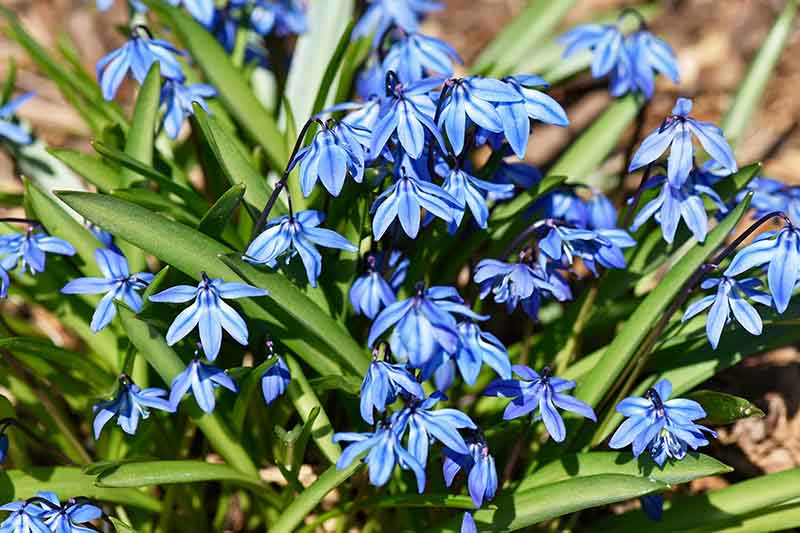
Ideal growing conditions include full sun to part shade, and average, well-draining soil that is slightly acidic.
Heights reach between 3 and 6 inches, and these show well in fronts of beds, border edges, containers, and window boxes. For maximum impact, mass planting is recommended.
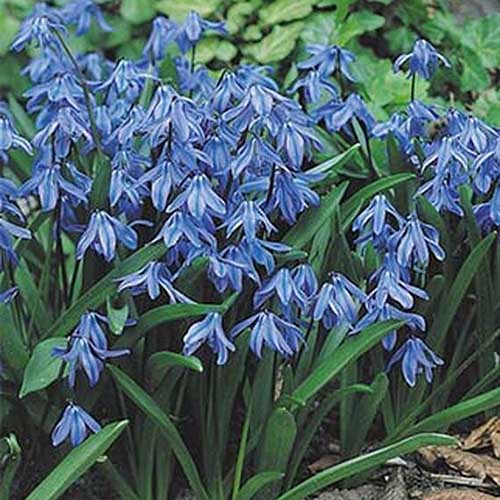
Siberian Squill
This plant does best in Zones 2 to 8.
Find Siberian squill bulbs now from Burpee in packages of 15.
8. Single Early Tulip
The Tulipa genus is a large one, with early-, mid-, and late-season flowers.
The single early tulip is a classic variety, with one row of colorful tepals that blooms early in the spring season, alongside the daffodils and crocuses.
The foliage is fleshy, elliptical, and sometimes tinged with purple.
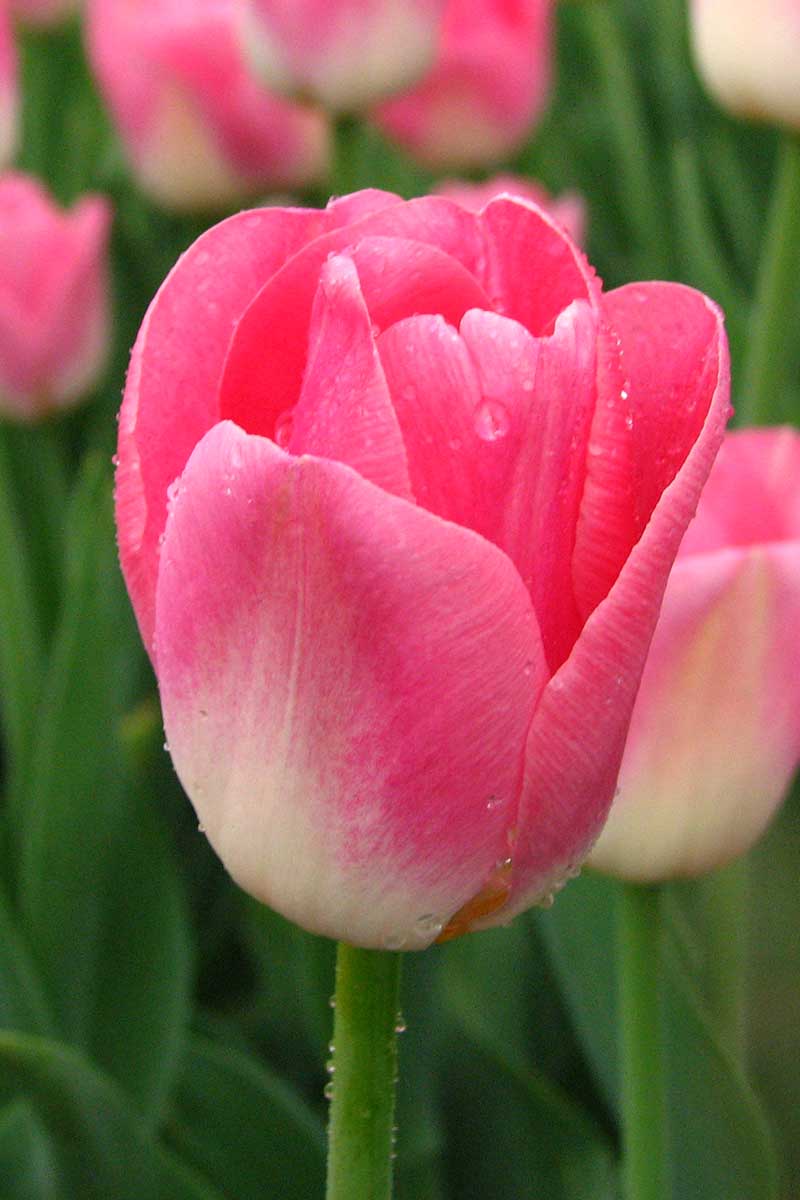
Colors include orange, pink, purple, red, white, and yellow. Stems are between 12 and 18 inches tall. Some cultivars are fragrant.
Tulips do best in a full sun location with average soil that drains well, and has a slightly acidic pH. They thrive in Zones 3 to 7.
Check out our tulip growing guide for more information on cultivation.
The medium height of tulips makes them suitable for the middle position in beds and borders, as well as container and mass drift plantings.
![]()
'Apricona'
There are many delightful cultivars. 'Apricona' is a peachy pink variety that begs for hidden Easter eggs and frolicking bunnies.
Find 'Apricona' bulbs now from Burpee in packages of 10.
9. Snowdrop
Frost-tolerant snowdrop, Galanthus spp., is a very early bloomer that often keeps company with the hellebore and crocus.
It has drooping, white, bell-shaped flowers with a splotch of green on the margin that resembles a tiny inverted heart. The leaves look like thick, fleshy grass.
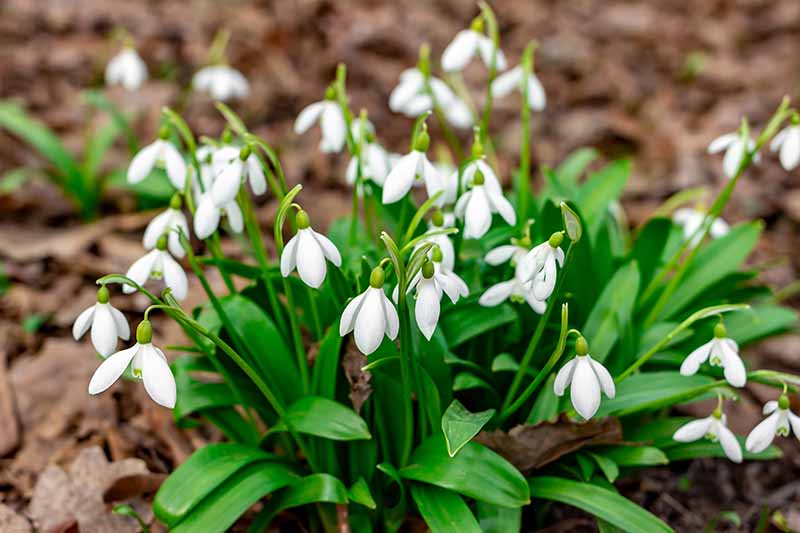
To grow snowdrops, provide a full sun to part shade location, and soil of any pH that is organically rich and well-draining.
Snowdrop has a clumping growth habit. It naturalizes readily in Zones 3 to 8. Heights reach 3 to 7 inches.
Enjoy the cheerful blooms in beds, borders, containers, and window boxes. Or, sow en masse for an uplifting drift as winter yields to spring.
Consult our snowdrop growing guide for cultivation information.
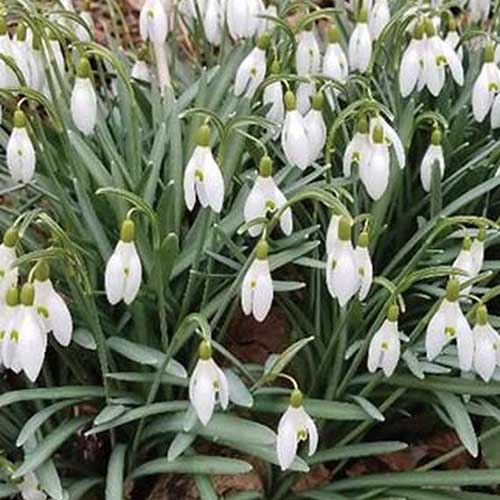
Galanthus nivalis
When shopping for snowdrop, you're likely to encounter multiple species with similar characteristics, including G. nivali and G. lewesii.
Find G. nivalis bulbs now from Burpee in packages of 25. Heights reach 4 to 6 inches, and flowers are slightly fragrant.
10. Trillium
Trillium, Trillium spp., is a native woodland wildflower that blooms on a single, bare stem that rises from a thick root called a rhizome.
It has three white petals that bend under at the tips. Beneath these petals are three green sepals.
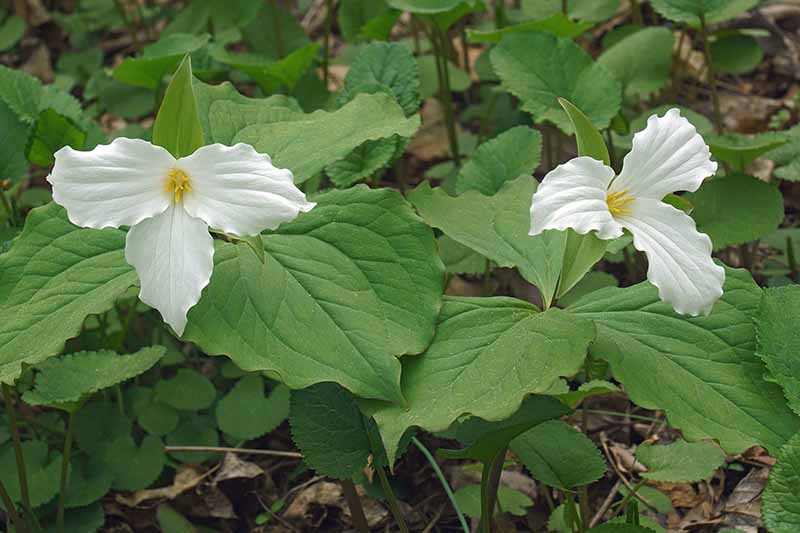
The foliage consists of three ovate, or egg-shaped, leaves that radiate around the stem in a pattern called a "whorl."
Trillium grows in part to full shade, where the soil is organically rich, slightly acidic, and well-draining. It is an ephemeral plant that dies to the ground and disappears soon after it's finished blooming.
If you've got a woodsy setting with lots of trees and shrubs, slowly colonizing trillium is a wonderful choice for creating natural-looking drifts.

Trillium
Heights range from 8 to 18 inches. Trillium thrives in Zones 4 to 8.
Find trillium now from Amazon. Choose from 5, 10, or 20 bare root pieces.
11. Winter Aconite
Winter aconite, Eranthus hyemalis, has bright yellow cup-shaped blossoms atop collars of deeply divided leaves.
It grows from swollen roots called tubers and has a petite 3- to 6-inch stature.
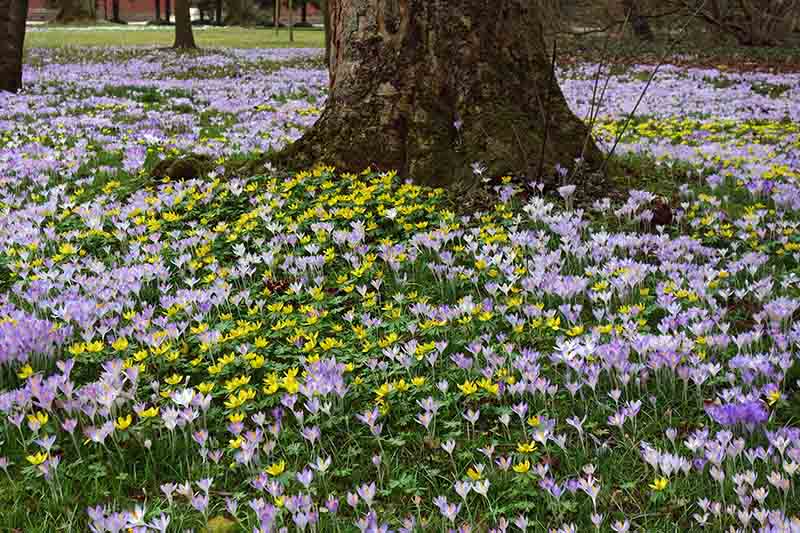
For optimal growth it requires full sun to part shade, and organically rich, alkaline soil that drains well. It spreads easily, and does well in the presence of black walnut trees. Juglone toxicity is not a concern.
Winter Aconite
Winter aconite is best suited to growing in Zones 3 to 7, where it blooms very early, from late winter into spring.
Find winter aconite bulbs now from Thronesfarm via Amazon in packages of 20.
Perennials
Perennials are hardy friends to the gardener. They winter over and burst forth according to their own inner time clocks, often while the last dregs of snow are still on the ground.
Here are some to count on for early color.
12. Bleeding Heart
Bleeding heart, Lamprocapnos spectabilis, has arm-like branches that support rows of dangling pink or red blossoms.
They resemble split, inverted hearts spilling a white teardrop tinged with yellow.
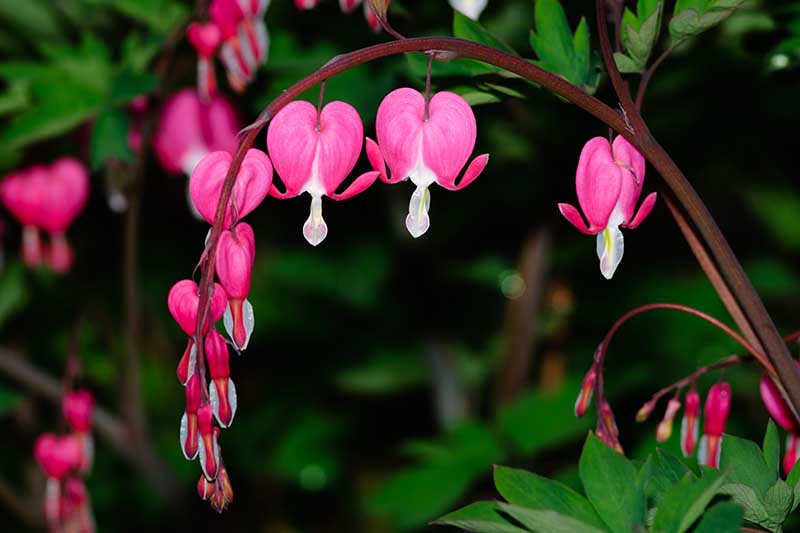
This plant is ephemeral with airy, feather-like foliage that dies to the ground after blooming.
Bleeding heart prefers a location with full sun to part shade, average soil, a neutral pH, and good drainage.
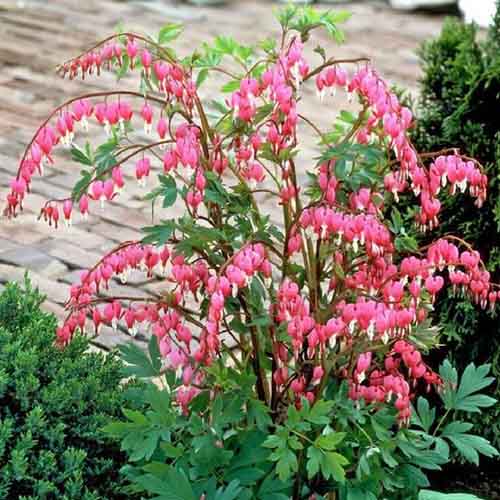
Bleeding Heart
Heights range from 1 to 3 feet. Shrub-like growth makes for an eye-catching stand-alone specimen, affording observers a close view of the unique flowers.
Be sure to read our guide to growing bleeding hearts for cultivation instructions.
This plant thrives well in Zones 3 to 9.
Find bleeding heart rootstock now from Eden Brothers in packages of 2, 4, or 10.
13. Carolina Jessamine
Carolina jessamine, Gelsemium sempervirens, is a native vine with showy, trumpet-shaped, scented yellow blossoms. The foliage is lanceolate, or lance-shaped, and shiny.

It prefers a full sun location where it can spread along the ground, or up and over a trellis, fence, or pergola.
The soil should be slightly acidic, organically rich, and well-draining.
Carolina Jessamine
Carolina jasmine can grow to heights of 12 to 20 feet and thrives best in Zones 7 to 10. In warmer regions, the foliage is evergreen, and in cooler climes, semi-evergreen.
See our guide for more information on growing Carolina jessamine.
Find Carolina jessamine plants now from Florida Foliage via Amazon in quantities of 3, 10, 20, 30,40, 50, and 60.
14. Columbine
Columbine, Aquilegia spp., is an ephemeral plant that dies to the ground and disappears after blooming.
Blossoms are orange, pink, purple, red, white, yellow, or bicolor.
An inner ring of petals is backed by star-like, spurred sepals, giving the appearance of a strange insect. The foliage is delicate and fern-like.
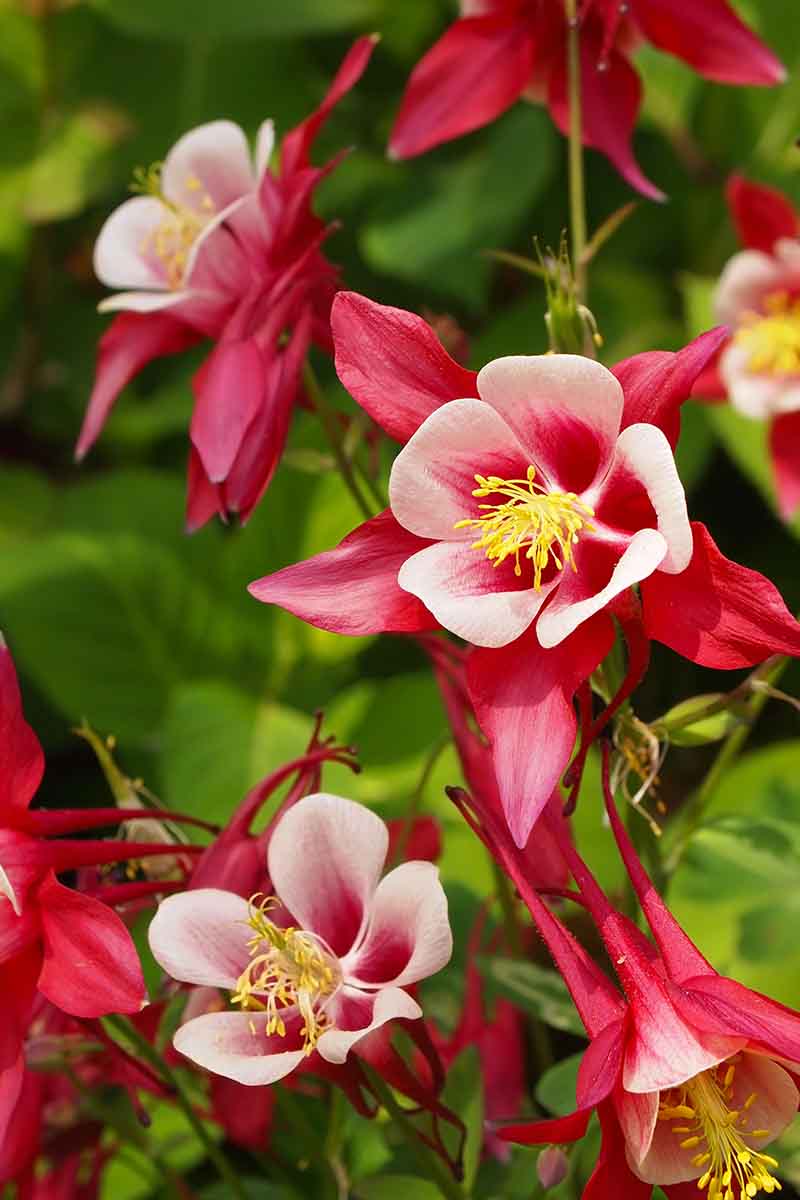
Columbine does best in full sun to part shade with average, well-draining soil and a fairly neutral pH.
There is a small native species as well as the large hybrids, so heights range from 8 to 18 inches.
It's recommended to plant different colors well away from one another, as cross-pollination is likely to cause color changes.
Learn how to grow columbine in our handy guide.
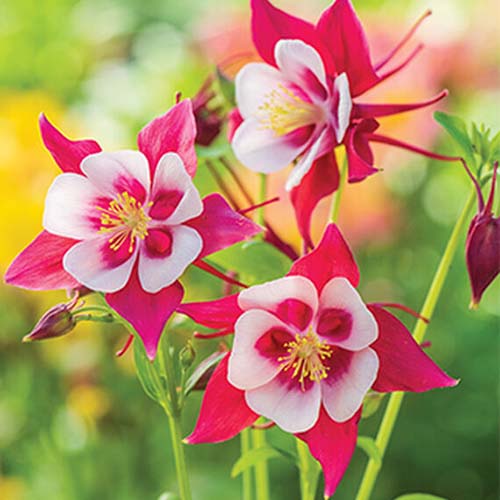
'Early Red and White'
Best suited to Zones 3 to 9, columbine is lovely in beds and borders, and makes a charming specimen plant for cottage and small-space gardens. It shares space well with dwarf iris.
Find 'Early Red and White' seeds now from Burpee in packages of 20.
This type boasts bright red sepals and coordinating red petal centers. Heights are between 14 and 20 inches for attractive mid-bed or stand-alone placements.
15. Dutchman's Breeches
Dutchman's Breeches, Dicentra cucullaria, is a native wildflower with upright to arching stems.
Suspended from these delicate stems are small white flowers tipped with yellow that look like little inverted pairs of pants.
This is an ephemeral plant whose flowers and foliage seem to vanish, as if by magic, after blooming.
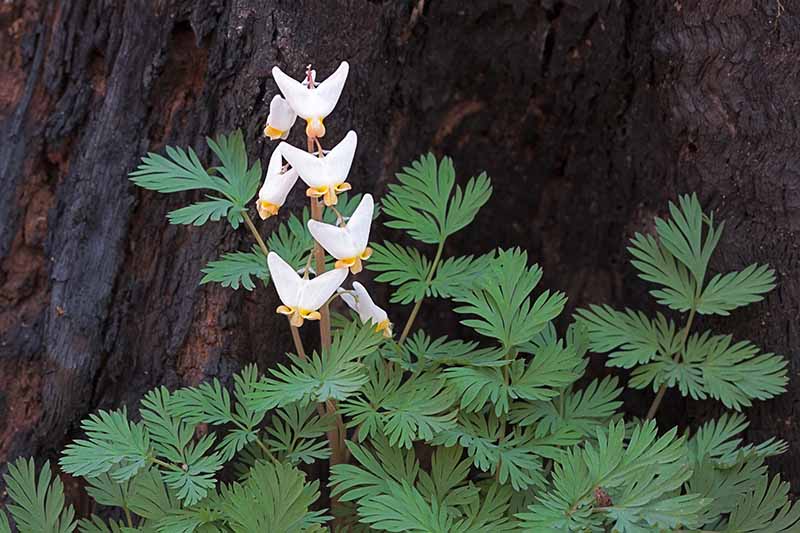
The foliage is deeply divided and reminds me a little of Italian flatleaf parsley.
Dutchman's breeches grows from fleshy rootstock. It thrives best in full to part shade, where the soil is organically rich, slightly acidic, and well-draining.

Dutchman's Breeches
Heights reach between 6 and 12 inches in Zones 3 to 7.
Use this plant as it is found in the wild, tucked underneath trees and shrubs, where it can be spotted during early spring walks through woodland property.
Find Dutchman's Breeches seeds now from Amazon in packages of 10.
16. Hellebore
Hellebore, Helleborus spp., is a large genus of winter to spring blooming flowers known best for their nodding heads and ability to bloom even in the snow.
Colors range from pinks and purples to whites, yellows, and greens. There may be a single row of sepals or an additional inner row of petals, as in varieties known as "doubles."
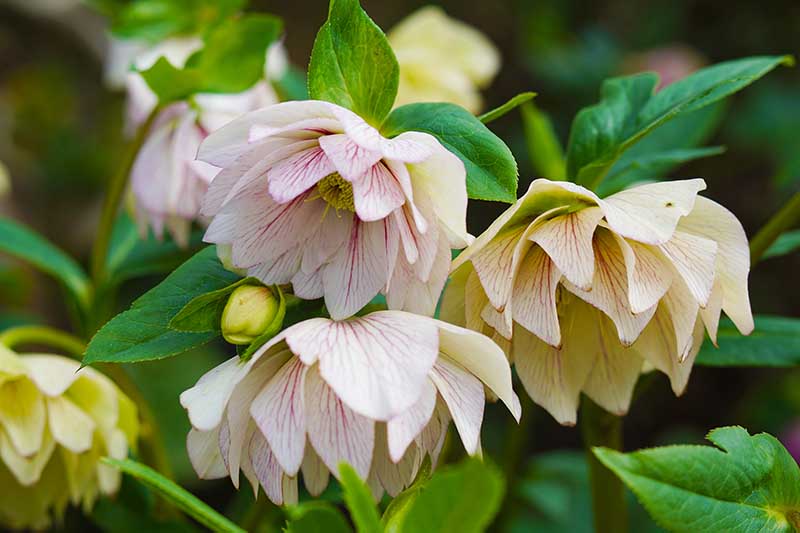
Foliage is deeply divided in palmate (radiating), or pedate (foot-like) fashion. It ranges from deciduous, matte, soft-textured, light green leaves to evergreen, shiny, leathery, dark green leaves.
Hellebore thrives in part to full shade with organically rich, well-draining soil that has a neutral to slightly alkaline pH.
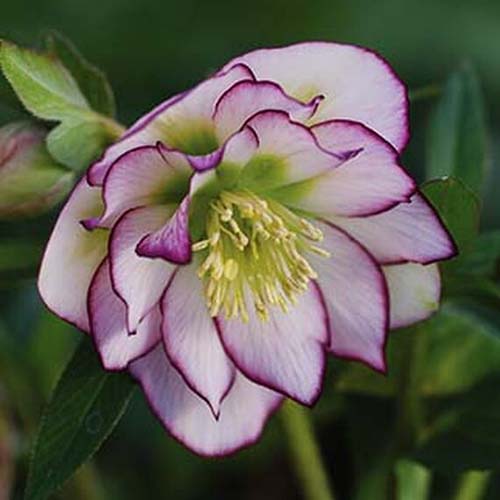
'Florence Picotee'
There are six classifications of hellebores encompassing approximately 20 species.
Heights range from 12 to 18 inches, making it suitable for mid-bed or border placements. It also looks lovely in a drift all its own.
Read our articles on hellebores to learn all about this late-winter to spring flowering plant.
Hellebore exhibits exceptional winter hardiness and frost tolerance in Zones 4 to 9.
Find 'Florence Picotee' plants now from Burpee. This is a double white variety with pink edges called "picotee." Expect a height of 12 to 16 inches. Plants are sold individually.
17. Pigsqueak
Pigsqueak, Bergenia cordifolia, has panicles, or drooping clusters, of dark pink blossoms.
The leaves are shiny, leathery, and heart-shaped, and arranged in rosettes. They squeak if you rub them, hence the name.
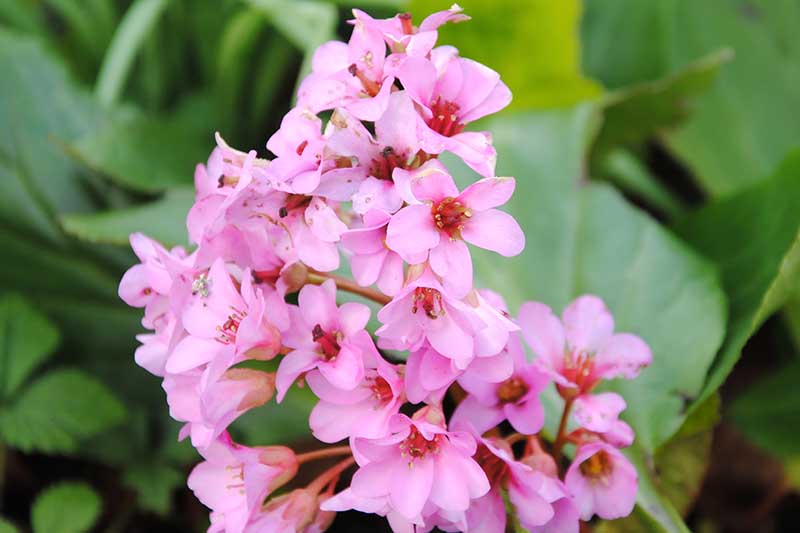
New spring growth has red stems, and the foliage is evergreen, deepening to burgundy in the fall.
This is a ground-covering plant that grows in dense clumps from seeds or fleshy rhizomes.
It's taller than most, topping out at 12 to 18 inches. Give it room to roam on sloped areas where it can both beautify the landscape and inhibit erosion at the same time.

Pigsqueak
Cultivate in full to part shade with average soil, a slightly acidic to neutral pH, and good drainage.
See our article on flowering ground covers for other seasonal bloomers.
Pigsqueak thrives in Zones 3 to 8.
Find pigsqueak seeds now from Ovmseeds via Amazon in packages of 100.
Read more about growing bergenia here.
Shrubs
Early shrubs contribute much to the season's watercolor look, with sensual blossoms in soft hues.
Here are some glorious plants for that mid-space between the canopy of trees budding above, and the blooming bulbs and perennials below.
18. Dwarf Flowering Almond
Dwarf flowering almond, Prunus glandulosa, has abundant pink to white single- or double-petal blossoms along its many stems.
After blooming, serrated light green deciduous leaves appear.
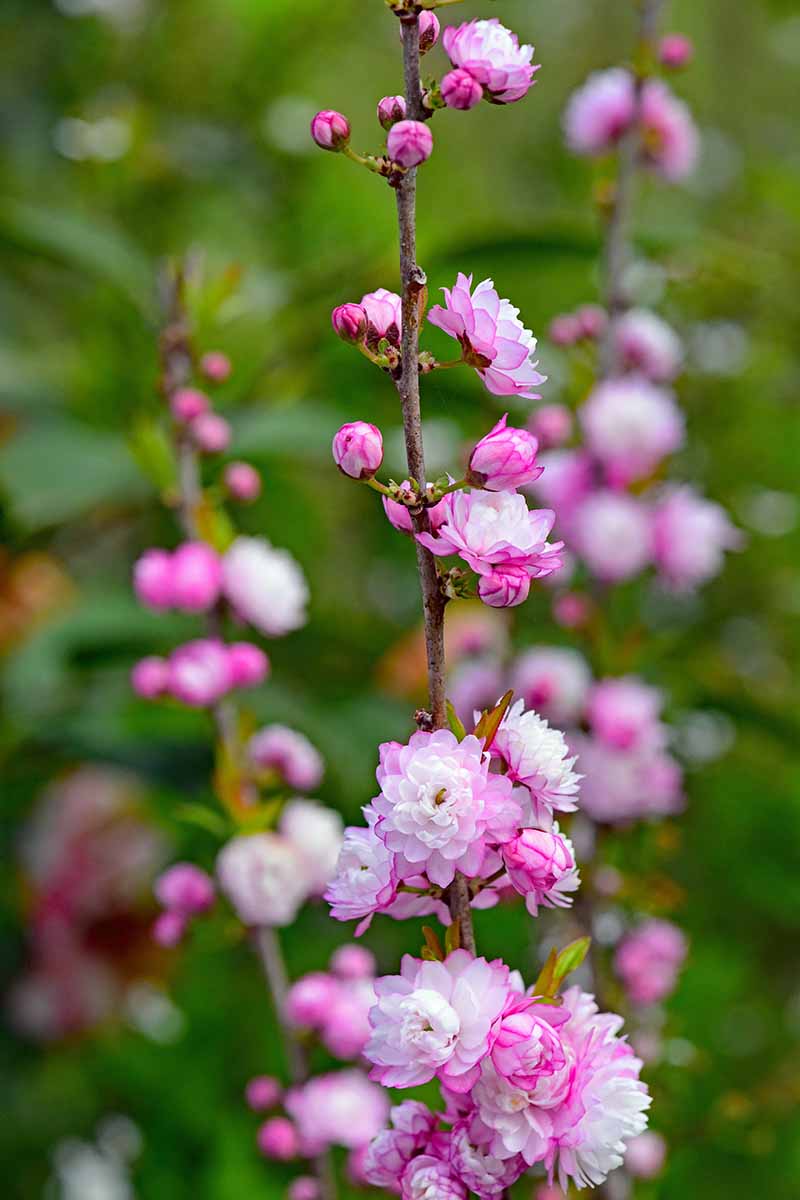
This shrub does best in full sun to partial shade with organically rich soil that drains well. The pH may vary from slightly acidic to neutral.
Perhaps the most noteworthy cultivar is 'Rosea Plena,' aka 'Sinensis.'
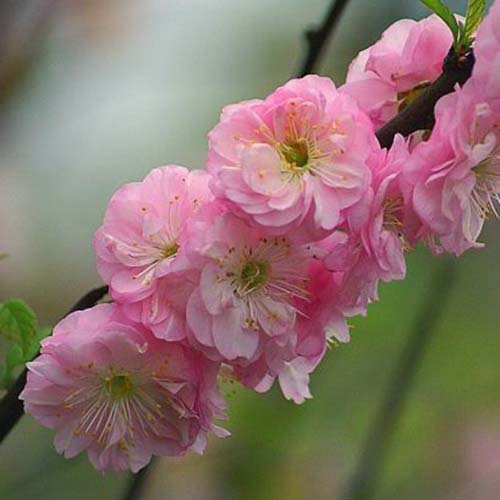
'Rosea Plena'
It is a pink double variety with the freeform shape and 4- to 5-foot height typical of the species.
For your best chance of success, cultivate this shrub in Zones 4 to 8.
Find 'Rosea Plena' plants now from Nature Hills Nursery.
19. Flowering Quince
Flowering quince, Chaenomeles speciosa, is a large deciduous shrub that bears small yellow-green edible fruit that you may like to make into jam, jelly, or preserves.
The blossoms are similar to those of a cherry tree, and have salmon-pink to red single or double petals.
The foliage consists of shiny, oval leaves that appear as the flowers drop. The branches are dense and often thorny.
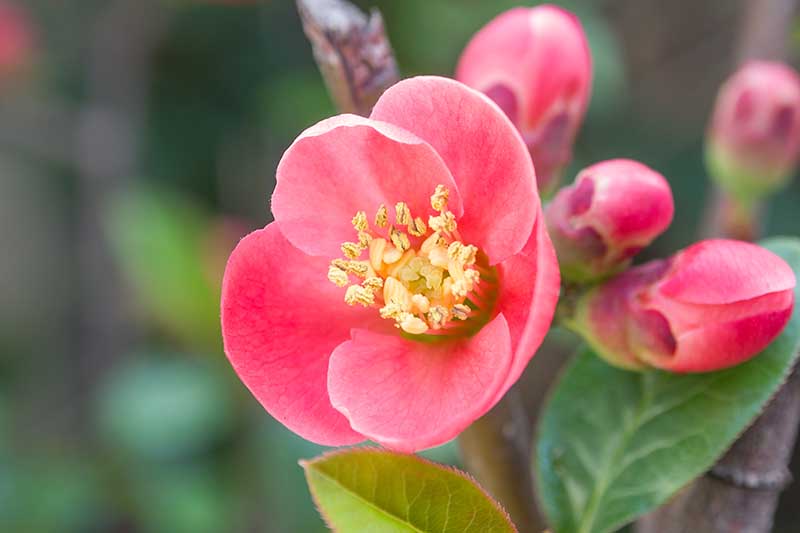
There are varieties suitable for Zones 4 to 9. Provide full sun to part shade, with average, acidic soil that drains well.
The overall shape tends to be rounded. Average heights are between 6 and 10 feet. Best uses include hedging and stand-alone plantings.
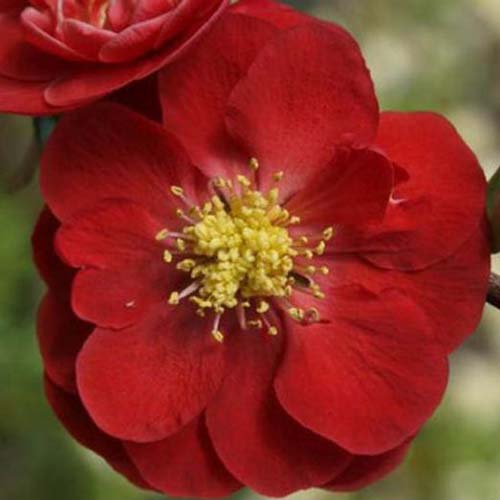
Double Take ™ 'Scarlet Storm'
'Scarlet Storm' is a particularly attractive variety with double-petal dark crimson flowers that bloom on 4- to 5-foot shrubs. This cultivar has no thorns.
Find Double Take™ 'Scarlet Storm' Quince plants now from Nature Hills Nursery. Choose from a sprinter (starter) pot, quart container, or #3 container.
Read more about growing flowering quince here.
20. Forsythia
Forsythia, Forsythia x intermedia, aka border forsythia, is a tall, deciduous shrub with slender, arching branches dotted with yellow blossoms.
Flowers spring directly from the stems, nodding their star-shaped yellow heads before most other blooms have awakened.
Narrow elliptical leaves sometimes appear before the flowers fall.
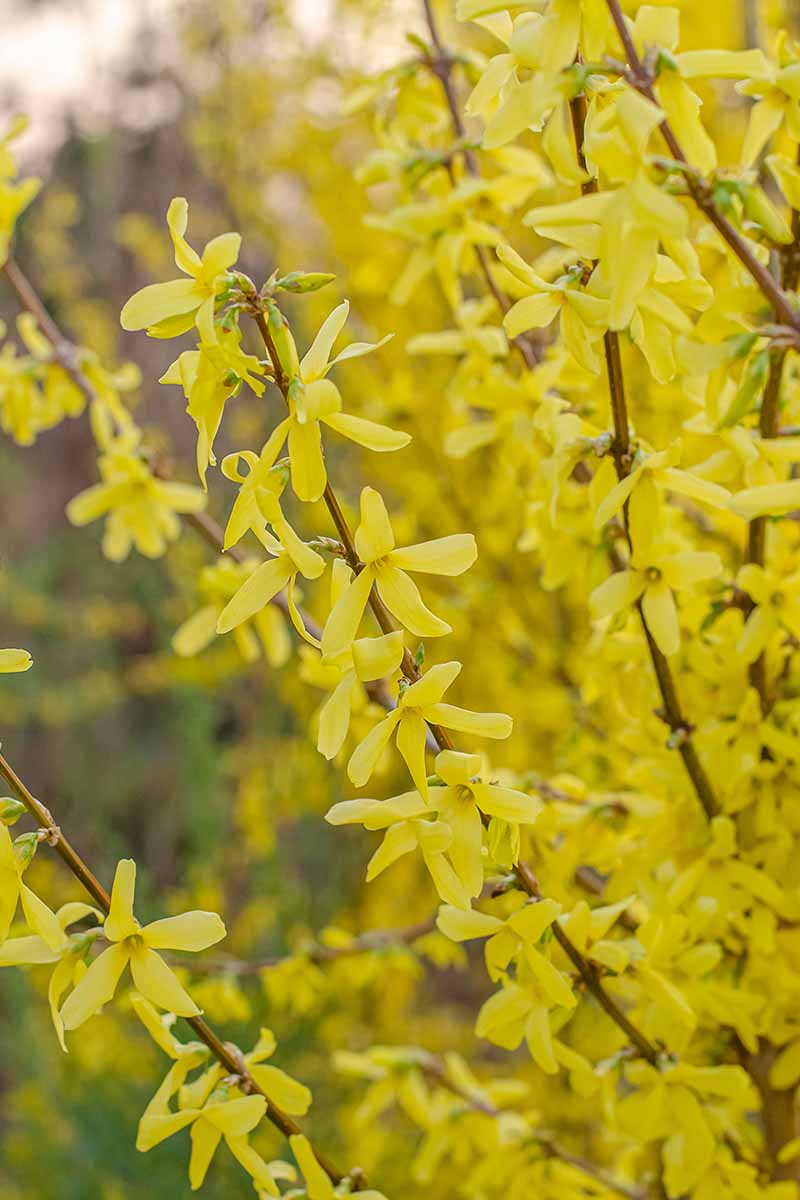
Best suited to Zones 5 to 8, forsythia grows to a mature height of 8 to 10 feet tall, with a slightly rounded shape. The leaves may turn bronze in the fall.
You can use this plant for hedging. Prune it to the height of your choice, or leave it to its own devices.
Or, give it room to spread its arching branches like fountains of yellow in a large drift of its own.
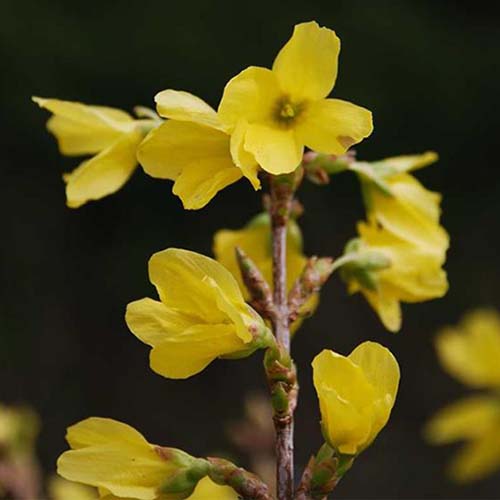
Forsythia
It's also attractive lining walkways and fences, especially with bright bulbs and perennials in the foreground.
Find forsythia rootstock now from the Arbor Day Foundation in one- to two-inch bare root pieces.
Read more about growing forsythia here.
21. Fothergilla
Fothergilla, Fothergilla x intermedia, has sweetly scented white flowers that resemble bottle brushes.
The foliage consists of small, elliptical leaves with prominent diagonal veining.
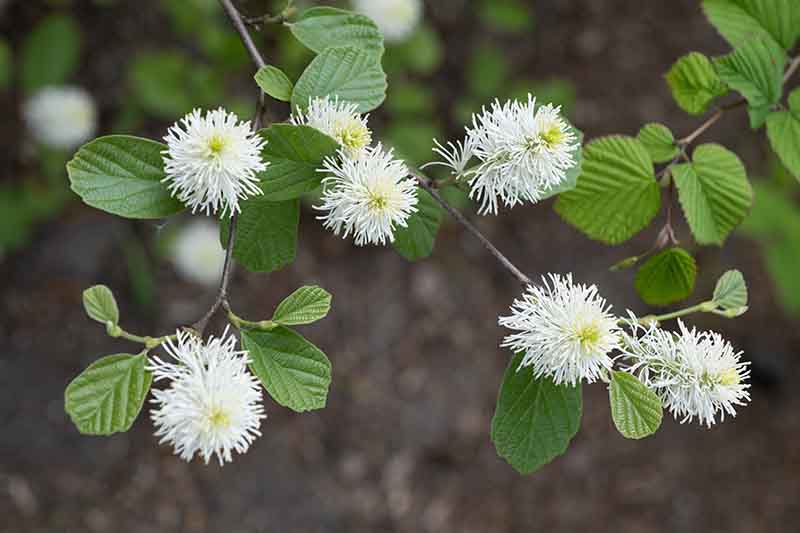
To grow this plant, select a full sun to part shade location. The soil should be acidic, organically rich, and well-draining.
Fothergilla varieties vary in height. Some dwarf types grow 3 to 5 feet tall, while larger ones can reach 6 to 10 feet at maturity.
Most varieties are suitable for growing in Zones 4 to 8.
In addition to the pretty flowers, fothergilla provides lovely fall color in shades of orange, red, and yellow.
'Mount Airy'
The 'Mount Airy' cultivar is an early type best suited to Zones 5 to 8.
It reaches a height of 3 to 5 feet at maturity. Use it for loose hedging along walkways, fences, and property perimeters.
Place it in the back of beds with bulbs and perennials in the foreground.
Find 'Mount Airy' starter plants now from WOD via Amazon in 2 1/2-inch pots.
22. Japanese Camellia
Japanese camellia, Camellia japonica, aka the rose of winter, has flowers that resemble flouncy, cottage garden English roses.
It comes in shades of pink, purple, red, white, and yellow. The smooth, shiny, oval foliage is evergreen in Zones 7 to 9, where it grows best.
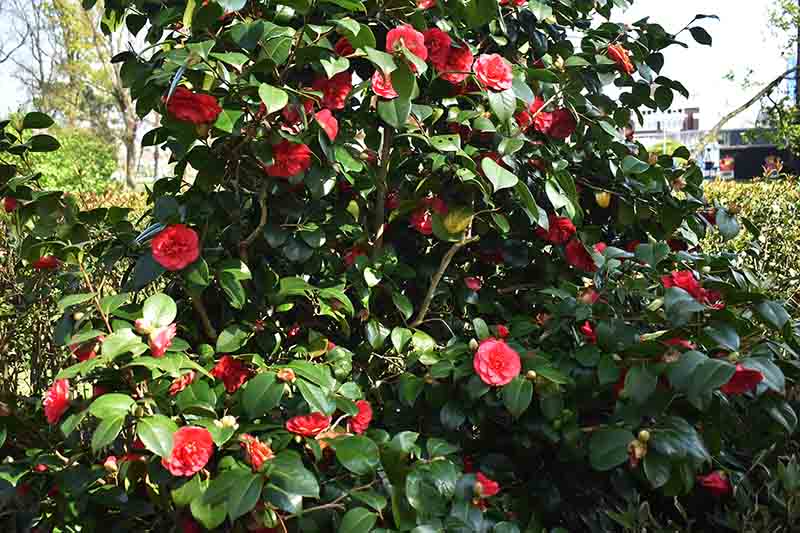
For cultivation, provide a location with part to full shade that is sheltered from strong winds. The soil should be acidic, organically rich, and well-draining.
There are numerous cultivars with mature heights ranging from 7 to 12 feet tall. The Japanese varieties grow a bit more slowly than other types.

'Sargent Red'
One you may like is 'Sargent Red.' It has rose-red flowers and tops out at 8 to 12 feet tall.
Find 'Sargent Red' plants now from New Life Nursery and Garden via Amazon in quart-sized pots.
23. Korean Spice Viburnum
Korean spice viburnum, Viburnum carlesii, has reddish buds that open to showy, rounded clusters of tiny white flowers, similar to those of hydrangea.
They have a spicy scent.
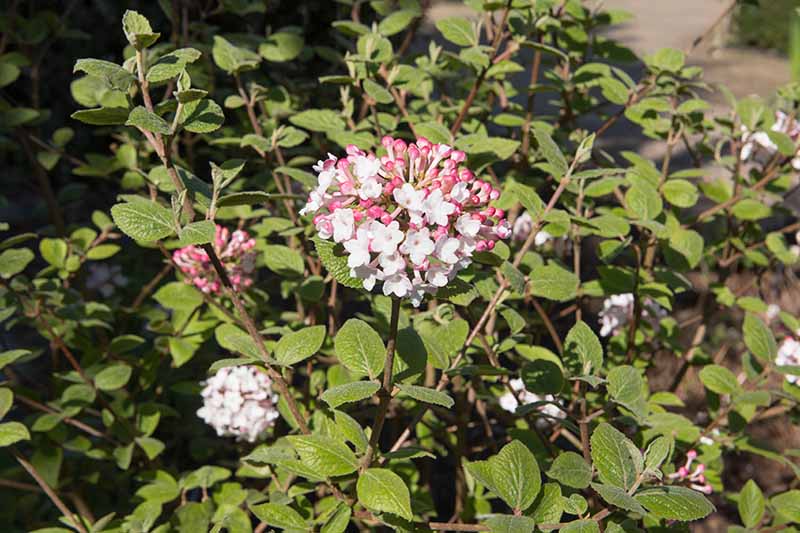
The foliage consists of elliptical leaves with prominent veining, sometimes tinged with red. They deepen to a delightful bronze color in fall.
To grow viburnum, choose a site in full sun to part shade with average, slightly alkaline soil that drains well.
Viburnum carlesii
With a mature height of 4 to 6 feet, these plants thrive in Zones 4 to 7.
You are likely to come across named cultivars and unnamed, "generic" varieties as you shop.
Find viburnum plants now from Hirt's Gardens via Amazon in four-inch pots. The cultivar for this type is not specified.
24. Pussy Willow
Pussy willow, Salix caprea, can grow as a shrub or a small tree. The long, bare stems of male plants bear furry gray and white catkins for intriguing early season interest.
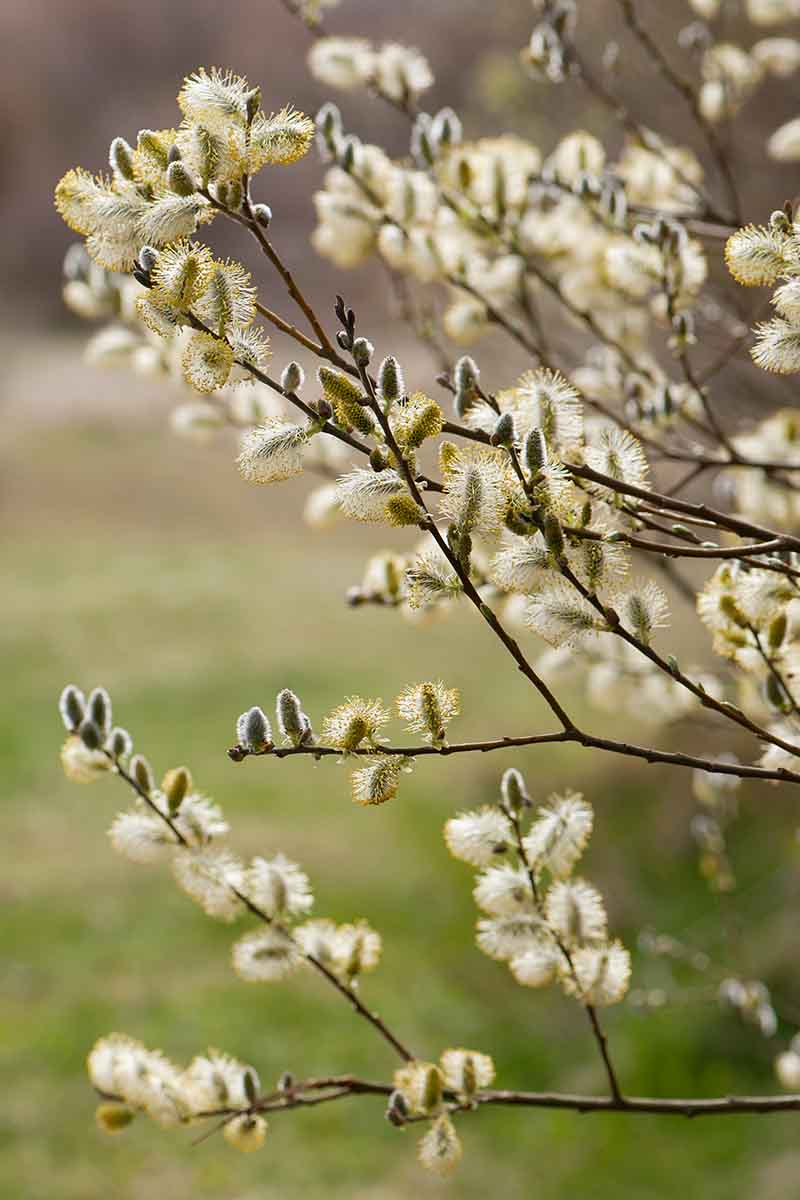
Find a spot with full sun to part shade for growing pussy willow. I had a beautiful small tree at one time, on the south side of my house.
It provided me with armloads of long stems for stunning floral arrangements.
Pussy willow reaches a mature height of 15 to 25 feet tall. By trimming the new canes (fresh spring stems) each year, I was able to maintain a manageable size.
To grow as a tree, trim away the side branches to establish a trunk. Plant bulbs and perennials around your tree for a pleasing focal point.
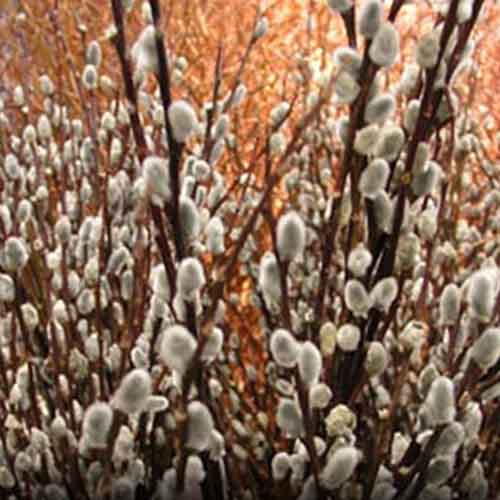
Pussy Willow
For cultivation as a bush, allow the lower branches to remain. This is a useful option for property perimeter plantings, hedgerows, or specimen planting in an island bed of its own.
Pussy willow requires soil that is acidic, organically rich, and well-draining. It thrives best in Zones 4 to 8, where it grows quickly.
In addition to Salix caprea, there's a North American native variety, Salix discolor, with smaller flowers.
Find pussy willow rootstock now from the Arbor Day Foundation in one-inch pieces.
25. Spring Heath
Spring heath, Erica x darleyensis, is also known as winter heath.
It's an evergreen ground cover with multiple overlapping stems that bear rows of tiny bright pink to red cylindrical flowers. The leaves are bright green needles.
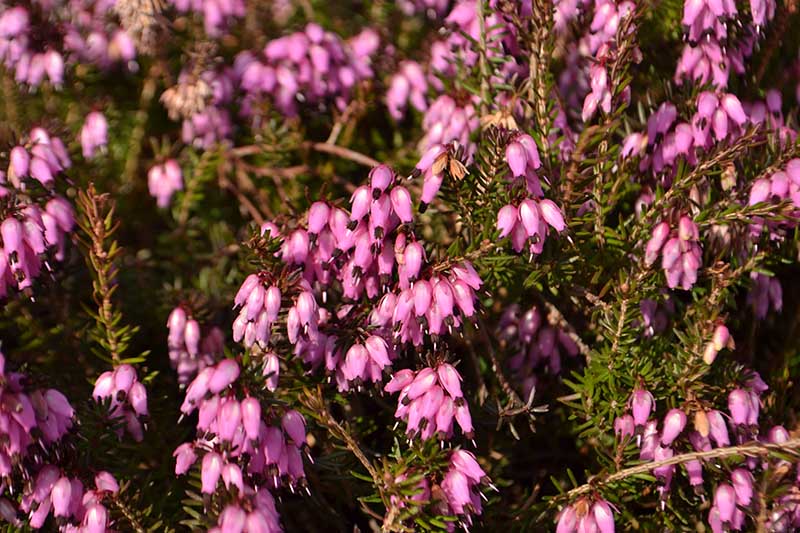
Spring heath prefers full sun and organically rich, well-draining, acidic soil. However, it has a high tolerance for poor acidic soil, as well.
Heights range from 12 to 15 inches tall at maturity.
It naturalizes slowly and is useful for inhibiting hillside erosion, border placement along sidewalks, hiding the legs of mid-size shrubs in sunny beds, and creating stand-alone evergreen drifts.

'Kramer's Red'
The 'Kramer's Red' cultivar is appreciated for its rich, color-saturated magenta blossoms.
Spring heath performs best in Zones 5 to 8.
Find 'Kramer's Red' plants now from Green Promise Farms via Amazon in 2-gallon pots.
Spring Has Sprung
We've introduced 25 flowering bulbs, perennials, and shrubs that bring spring gardens to life.
While some may already be familiar, I encourage you to explore each type, because new varieties are being cultivated all the time.
I never dreamed we'd have pink daffodils, did you?
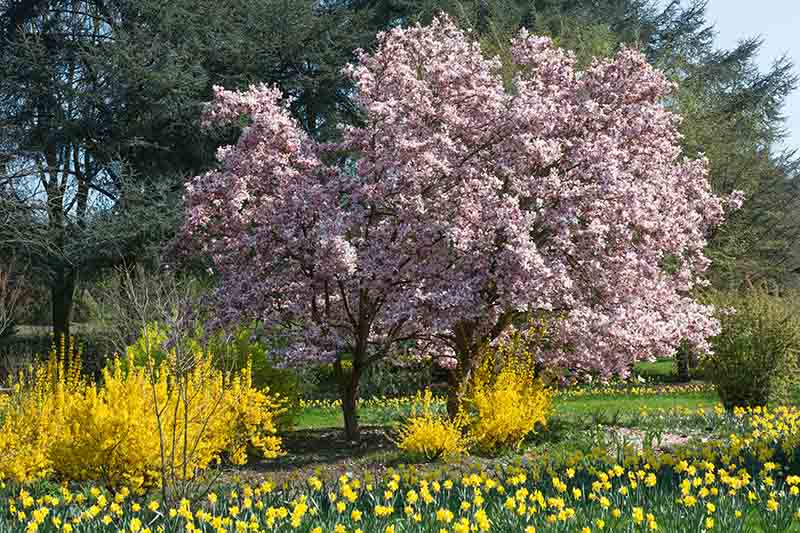
Incorporate early spring flowers into existing gardens, or give them new spaces of their own, where they can sing out that spring has surely sprung.
To learn more about growing spring plants, you'll need these guides next:
- Don't Forget Your Spring Garden Checklist!
- Your Guide to Fall and Spring Perennial Cutbacks and Pruning
- Design and Construct Gorgeous Spring Planters for Porches and Patios
Photos by Nan Schiller © Ask the Experts, LLC. ALL RIGHTS RESERVED. See our TOS for more details. Product photos via Arbor Day Foundation, Burpee, Caribbeangardenseed, Eden Brothers, Florida Foliage, Green Promise Farms, Hirt's Gardens, New Life Nursery and Garden, Nature Hills Nursery, Ovmseeds, Thronesfarm, and WOD. Uncredited photos: Shutterstock.
small blue flower blooms early spring
Source: https://gardenerspath.com/plants/flowers/early-spring-flowers/
Posted by: hudsonobjectioneve.blogspot.com

0 Response to "small blue flower blooms early spring"
Post a Comment